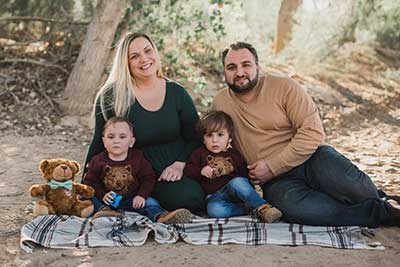Caputo Kids Conquer Delays
Thanks to amazing services for special-needs kids
Tubes, harsh lighting, alarms beeping, pricks and pokes. This is how Luca and Dominic were introduced to the world. Born at just 26 weeks (instead of the typical 37 to 40), the brothers’ first weeks of life were restricted to the sterile, clinical environment of a hospital’s neonatal intensive care unit (NICU). Dominic spent 131 days in the NICU; Luca was released after 157 days. These were rough days for the boys and extremely stressful days for new parents, Samuel and Melinda (Mindy) Caputo. Fortunately, help came to them in many forms: doctors, nurses and other health care professionals. During the 18 to 22 weeks in the NICU, a social worker set up hospital-to-home transition plans, including arranging for services by the Department of Economic Security’s (DES) Arizona Early Intervention Program.

Dominic (left) and Luca Caputo celebrate their 3rd birthday.
“We prepared everything in the hospital because we were there so long,” said Mindy Caputo. “The social worker [at Banner Desert Medical Center] was really great. She had gotten the process rolling really quickly, so we had everything approved upon discharge.”
The Arizona Early Intervention Program (AzEIP) offers support to families for infants and young children with special needs. A child is considered to be significantly developmentally delayed when he or she has not reached 50% of the developmental milestones expected at his or her chronological age.
The brothers “missed milestones mainly because they were in bed for so long,” explained Caputo. According to Contemporary Pediatrics, “[early intervention] can successfully facilitate independent mobility in an infant who has been restricted by technological dependence for many months.”
“It wasn’t a natural environment. Also, they were sick. They were going through a lot of things, developmentally, due to their illness.”
When they were finally discharged, Dominic was diagnosed as being at risk for developmental delay, and Luca was diagnosed as at risk for cerebral palsy. AzEIP builds upon and provides supports and resources to assist families, like the Caputos, to enhance their children’s learning and development. AzEIP Service Coordinator, Stephanie Davis, worked with the family to establish an Individualized Family Service Plan (IFSP).
“We would all together create goals … and we would work together as a team to help [Luca and Dominic] meet those goals,” said Caputo. Among other things, the IFSP called for weekly, in-home physical and speech therapies.
AzEIP provides supports to significantly developmentally delayed children from birth up to age 3. Dominic and Luca were doing so well, they were able to graduate from the Early Intervention Program ahead of schedule. During the AzEIP exit interview with the family, Davis conducted a review for services to be provided by the DES Division of Developmental Disabilities (DDD).

The Caputo family.
By this time, Luca was diagnosed with cerebral palsy and at risk for Autism Spectrum Disorder. Luca currently receives occupational (OT), physical (PT), speech, feeding and applied developmental analysis (ADA) therapies through DDD.
The transition from AzEIP to DDD “has been going really good,” said Caputo. “[Luca] started walking in January. He’s a new walker, but he looks great.” Luca’s physical therapy helps with his walking. “He’s been doing so well with that. It’s been incredible. PT is helping with his very mild hip dysplasia, so it’s really helping him build that core strength. OT has been really helping with desensitizing things with the feeding. OT is kind of overlapping with feeding [therapy] a lot right now.” Caputo describes Luca as being less verbal than his brother Dominic. Luca has “about 90 words where Dom has 500, so it’s a big gap.”
“Dominic has some balance issues primarily due to his being a micro-preemie, [born] 14 weeks early, so he does have some issues with overall balance. So that’s really a big thing in PT right now. OT, we’re working on potty training with him because he’s ready. [Dominic is] also brushing his teeth, eating and being just part of the world, I guess you can kind of say. He is definitely a 3-year-old, through and through. Where[as] Luca is more like a 2-ish-year-old developmentally.”
As Davis explained, “The brothers have been in the [AzEIP] program since they were coming home from the NICU.” And they continue receiving services as part of the DDD family. AzEIP and DDD - two out of more than 40 social service programs available through DES.
“I always tell everybody about getting your services and know what services are available,” advised Caputo. “Especially in the state of Arizona. We have such amazing services for special needs kids or special circumstances!”

